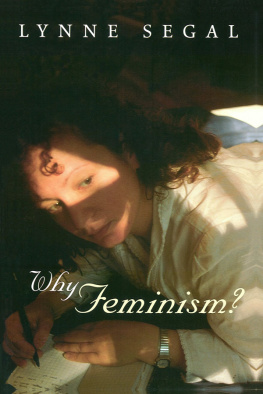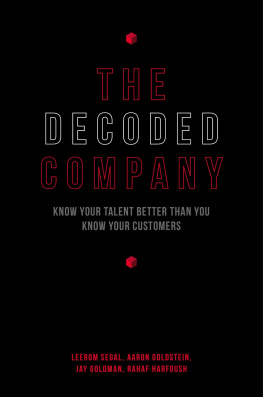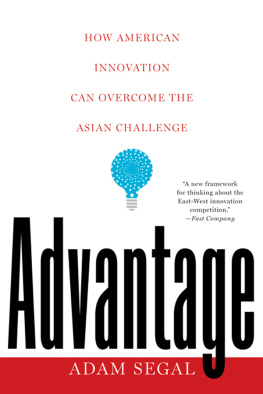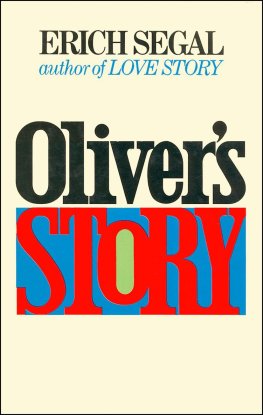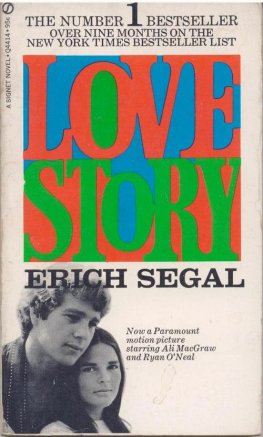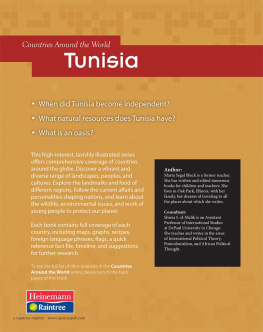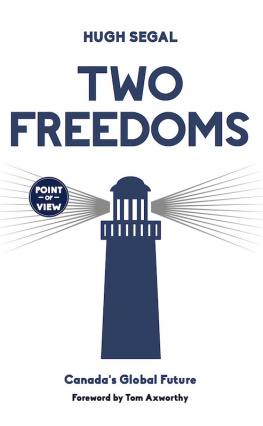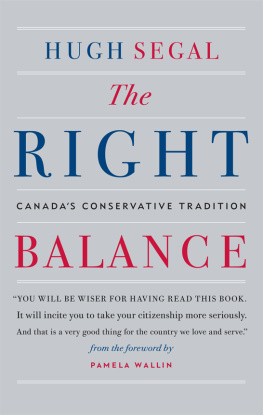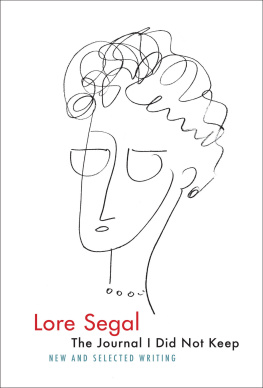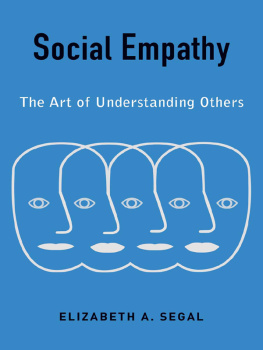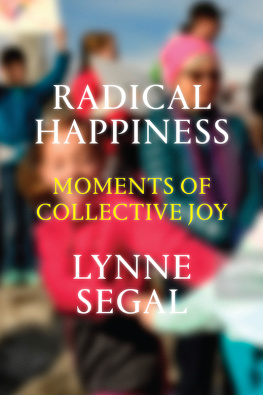Segal - Why Feminism?
Here you can read online Segal - Why Feminism? full text of the book (entire story) in english for free. Download pdf and epub, get meaning, cover and reviews about this ebook. year: 2015,1999, publisher: Wiley, genre: Politics. Description of the work, (preface) as well as reviews are available. Best literature library LitArk.com created for fans of good reading and offers a wide selection of genres:
Romance novel
Science fiction
Adventure
Detective
Science
History
Home and family
Prose
Art
Politics
Computer
Non-fiction
Religion
Business
Children
Humor
Choose a favorite category and find really read worthwhile books. Enjoy immersion in the world of imagination, feel the emotions of the characters or learn something new for yourself, make an fascinating discovery.
Why Feminism?: summary, description and annotation
We offer to read an annotation, description, summary or preface (depends on what the author of the book "Why Feminism?" wrote himself). If you haven't found the necessary information about the book — write in the comments, we will try to find it.
Why Feminism? — read online for free the complete book (whole text) full work
Below is the text of the book, divided by pages. System saving the place of the last page read, allows you to conveniently read the book "Why Feminism?" online for free, without having to search again every time where you left off. Put a bookmark, and you can go to the page where you finished reading at any time.
Font size:
Interval:
Bookmark:

For Peter
Copyright Lynne Segal 1999
The right of Lynne Segal to be identified as author of this work has been asserted in accordance with the Copyright, Designs and Patents Act 1988.
Reprinted 2002, 2005
Polity Press
65 Bridge Street
Cambridge CB2 1UR, UK
Polity Press
350 Main Street
Malden, MA 02148, USA
All rights reserved. Except for the quotation of short passages for the purposes of criticism and review, no part of this publication may be reproduced, stored in a retrieval system, or transmitted, in any form or by any means, electronic, mechanical, photocopying, recording or otherwise, without the prior permission of the publisher.
Except in the United States of America, this book is sold subject to the condition that it shall not, by way of trade or otherwise, be lent, resold, hired out, or otherwise circulated without the publishers prior consent in any form of binding or cover other than that in which it is published and without a similar condition including this condition being imposed on the subsequent purchaser.
ISBN 0-7456-2346-8
ISBN 0-7456-2347-6 (pbk)
A catalogue record for this book is available from the British Library.
Typeset in 11 on 13 pt Berling
by Ace Filmsetting Ltd, Frome, Somerset
Printed and bound in Great Britain by Marston Book Services Limited, Oxford
This book is printed on acid-free paper.
For further information on Polity, visit our website: www.polity.co.uk Contents
Fewer people than usual helped me with this book, which says something about these times. As pressures to publish from within the administration of academic space encounter the shrinking possibilities for cross-over writing with mainstream publishers, and the fractiousness between feminists is matched by the decline in collective political engagements, I wasnt confident I could manage to write at all any more: no longer sure of whom I would be writing for, or why. But I am still lucky enough to find myself within networks in which feminism, and often even socialism, are lifetime commitments, which continue to inspire me. I would like to thank John Fletcher, Catherine Hall, Katherine Johnson, Cora Kaplan, Loretta Loach, Mandy Merck, David Newson, Sheila Rowbotham, Alan Sinfield, Barbara Taylor, Ruth Thackeray and Leonore Tiefer for advice, assistance or encouragement. I am very grateful for the support of my editor David Held. Above all, I value the love, generosity and rigorous red pen of Peter Osborne, without whom
Why is feminism still so contentious? Feminism grew too big for its marching boots in the closing years of the 1970s; since then, many of its exponents have taken a more reflexive turn. But the anxiety it generates has far from dissipated. Indeed, feminists even frighten each other. Today, maverick voices emerge on all sides, rebuking a politics they claim to espouse. Many a monster can march about flying the banner of freedom or feminism, philosopher Jean Bethke Elshtain alleges from the USA condemning women who do not subordinate their own rights to the welfare of their children. In these pages, I try to make sense of the mlange of contemporary feminism. I wonder whether we can still look to it for a confrontational and broadly transformative politics and culture, or whether it has become little more than a blip in the march of economic neo-liberalism.
It is hard to avoid either idealizing or trashing ones past, feeding the unruly envy between and within political generations. It is harder still, and obviously foolhardy, to engage in any form of futurology. In all social movements, once the excitement of finding a new collective identity begins to ebb, everyday politics becomes a more discouraging, even tedious affair; a matter of competing interests and conflicting alliances. It never remains the revelation which first inspired new levels of self-confidence and hope, as it was when womens liberation erupted into the lives of many women at the close of the 1960s. Yesterdays visionaries are todays scapegoats, when not newly tamed and domesticated.
The declining passion for politics evident in many veteran feminists, accompanying the frank rejection of feminism by many young women, is part of a wider exhaustion of utopian energies since the 1980s, a time often described as post-socialist, if not post-political.
Indeed, current debates are obsessed with gender contrasts and conflicts, often packaged as slanging matches between feminists themselves: movement feminists, like British old-timer Bea Campbell, are pitted against American celebrity feminists/anti-feminists, like Camille Paglia. Here womens political differences can be made to service antithetical desires: serious interest in gender issues and the satisfaction of misogynist expectation. However dubious its delivery, though, there is no doubting the continuing social centrality of gender anxieties whether triggered by family breakdown, new laddism, teenage pregnancy or some other form of sexual or social panic. This means that as a feminist it is hard to remain detached from the political arena, whether or not one feels able to preserve or refashion ones political visions or, harder still, ones collective engagements.
Yet, we must persist, why feminism? Is the time for the renewal of feminism not long past, given the remarkable shifts in gender relations? Gender disruptions are indeed ubiquitous, as I illustrate throughout this book, but surely men are now often its victims, whether in the classroom, the workplace or the divorce courts. Moreover, publishers (especially feminist ones) have been suggesting that there is no market any more for specifically feminist books.. With feminism posed against women, and gender posed against politics, what in the world do we make of feminism today?
A mere generation ago, it caused little surprise when the American poet Adrienne Rich declared feminism a renaissance far more extraordinary and influential in shifting perspectives than the effects of the move from theology to humanism in the European Renaissance. Boring, perhaps, but still capable of stirring up enormous animosity, and never left to rest in peace.
Suitably distanced from feminisms supposedly dour defenders, Toynbee herself proceeds to produce a thoughtful summary of why women need feminism: continuing inequalities in their earnings, the difficulties of being torn between careers and children, their greater vulnerability to domestic violence and rape, especially when most financially dependent on a man as the mothers of young children. Pass, predictable, prosaic; yet the common sense of our age. Who wants yesterdays slogans? Who wants yesterdays woman? In fact, it is not just feminism, but participation in the public terrain of politics itself which is now commonly dismissed as boring, or assumed to be motivated by an exclusive self-interest, in a world where individualism has intensified with an awesome vengeance, demolishing most of its erstwhile critics; or at least, those whose politics cannot be reduced to the vivid provocation of rebellious lifestyles. The irony is that current forms of feminism display an extraordinary endurance and diversity; so varied, indeed, that common ground can be hard to find.
What is feminism? Who is a feminist? Contention rather than accord is what we must explore in answering such questions today. This is a perplexing situation for those who identified with a movement which, during its activist peak, preferred to operate through consensus. Moving on from the burning questions, bonfires and street parades, the change in the self-conception of the womens movement was the beginning of an always ambivalent slide into the cultural mainstream: goodbye to Womens Liberation, with its clenched fist, its militant slogans and joyful songs (The Womens Army is Marching); hello to feminism, with its diffuse theoretical underpinnings and performative uncertainties (doing feminism, doing gender). Could you please say a few sentences without using the word struggle?, interviewers of feminists in the mid-1970s used to ask, when we held forth on our goals and aspirations, believing that we could work to better the lives of women everywhere. Could you please tell me what your struggle for health, housing, clean water, union recognition [or some other bread-and-butter issue], has to do with feminism?, one might easily hear today.
Next pageFont size:
Interval:
Bookmark:
Similar books «Why Feminism?»
Look at similar books to Why Feminism?. We have selected literature similar in name and meaning in the hope of providing readers with more options to find new, interesting, not yet read works.
Discussion, reviews of the book Why Feminism? and just readers' own opinions. Leave your comments, write what you think about the work, its meaning or the main characters. Specify what exactly you liked and what you didn't like, and why you think so.

